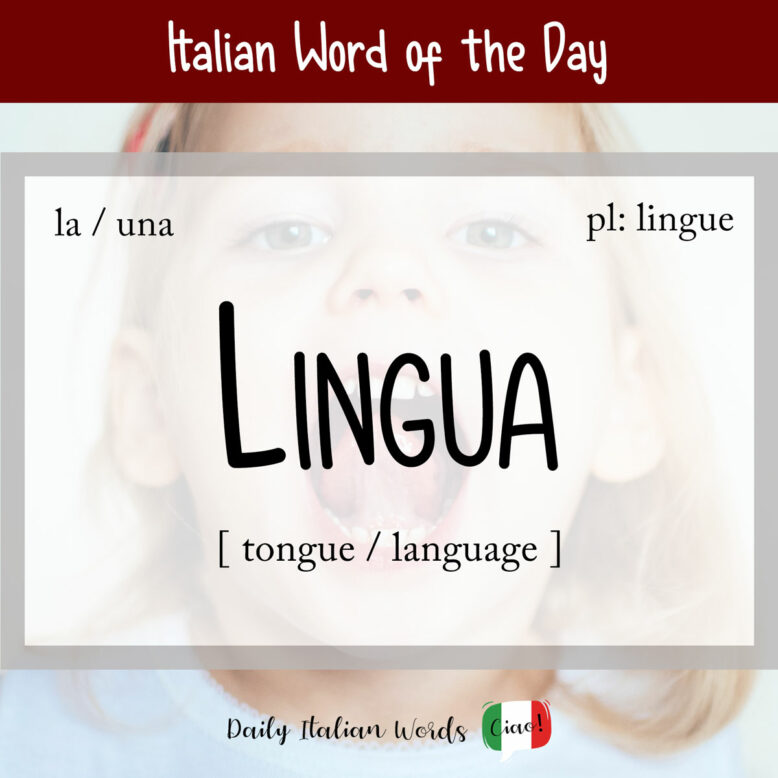Today, we’re delving into a word that lies at the heart of human communication. Whether referring to the physical organ itself (tongue) or the words it generates through articulation (language), la lingua is indispensable for expressing and exchanging our thoughts effectively!
lingua
tongue / language

Before we begin, let’s take a quick look at its etymology. Lingua comes from the Latin lingua of the same spelling and meaning. It comes from the Old Latin *dingua, from Proto-Italic *denɣwā, and ultimately from Proto-Indo-European *dn̥ǵʰwéh₂s (“tongue”). In short, it’s a word with very ancient origins!
Lingua is a feminine noun that takes the following definite and indefinite articles:
- la lingua = the tongue / language
- una lingua = a tongue / language
- le lingue = the tongues / languages
- delle lingue = some tongues / languages
Lingua = Tongue
The original meaning of lingua was tongue, as in the muscular organ in the mouth of a mammal used for tasting, swallowing, licking, and of course, speaking in humans.
To stick out one’s tongue can be expressed with either mostrare (to show) or tirare fuori (to pull out).
Elia mi ha mostrato la lingua.
Elia stuck out his tongue at me.
In addition to the tongues of living mammals, lingua can also refer to the culinary delicacy tongue, as in lingua bollita (boiled tongue). Figuratively, you may hear it used to describe a strip of land that looks like a tongue.
Here are a few additional terms that derive from the word lingua:
- linguaccia = sticky-out tongue, slander
- linguacciuto = gossip
- linguetta = tab, flap, tongue of a shoe
- linguina = linguini (type of pasta, literally “little tongues”)

Lingua = Language
Since tongues are intricately tied to speech, the term lingua came to represent language as a whole, not to mention individual languages as well. Here are a few of the world’s most studied languages:
- la lingua inglese / l’inglese = the English language / English
- la lingua italiana / l’italiano = the Italian language / Italian
- la lingua francese / il francese = the French language / French
- la lingua spagnola / lo spagnolo = the Spanish language / Spanish
- la lingua giapponese / il giapponese = the Japanese language / Japanese
- la lingua cinese / il cinese = the Chinese language / Chinese
- la lingua araba / l’arabo = the Arabic language / Arabic
- la lingua russa / il russo = the Russian language / Russian
Quante lingue parli?
How many languages do you speak?
Often, la lingua is specifically used to refer to the Italian language, without explicitly mentioning the adjective italiana. Likewise, when used in its plural form, le lingue, it can indicate foreign languages, without the need for the adjective straniere (foreign).
Mi piace studiare le lingue (straniere).
I like studying (foreign) languages.
You can also use lingua to describe the type of language used in a particular situation or context, or by a specific group of people, such as la lingua burocratica (bureaucratic language) or la lingua colloquiale dei giovani (the casual language of young people).

A very close synonym of lingua is linguaggio. While lingua generally refers to a language or tongue, both in the literal sense and the figurative sense, linguaggio specifically refers to the use or expression of language, often emphasising its structure, style, or complexity. While lingua focuses on the language itself, linguaggio emphasises its usage, including its cultural and social dimensions. Linguaggio is also preferred for any communication code that isn’t a spoken lingua, such as il linguaggio dei sordomuti (sign language), il linguaggio corporeo (body language) and il linguaggio HTML (HTML code).
Here are some other language related terms you are bound to hear as your Italian improves:
- lingua madre = mother tongue (the language)
- madrelingua = native speaker
- lingua franca = lingua franca
- lingua straniera = foreign language
Idioms using the word ‘lingua’
To conclude this article, let’s delve into the diverse idiomatic expressions featuring the word lingua. As you might expect, there are plenty of them to explore!
Avere (qualcosa) sulla punta della lingua
Literal translation: to have (something) on the tip of the tongue
English meaning: to have (something) on the tip of one’s tongue
Avere la lingua svelta
Literal translation: to have the quick tongue
English meaning: to be a fast talker
Frenare / Mordersi la lingua
Literal translation: to put the brakes on / to bite the tongue
English meaning: to bite one’s tongue
Tenere a freno la lingua
Literal translation: to keep the tongue on the brake
English meaning: to hold one’s tongue
Non avere peli sulla lingua
Literal translation: to have no hairs on the tongue
English meaning: to not mince words
Avere la lingua lunga / sciolta
Literal translation: to have the long / loose tongue
English meaning: to talk too much
Heather Broster is a graduate with honours in linguistics from the University of Western Ontario. She is an aspiring polyglot, proficient in English and Italian, as well as Japanese, Welsh, and French to varying degrees of fluency. Originally from Toronto, Heather has resided in various countries, notably Italy for a period of six years. Her primary focus lies in the fields of language acquisition, education, and bilingual instruction.


